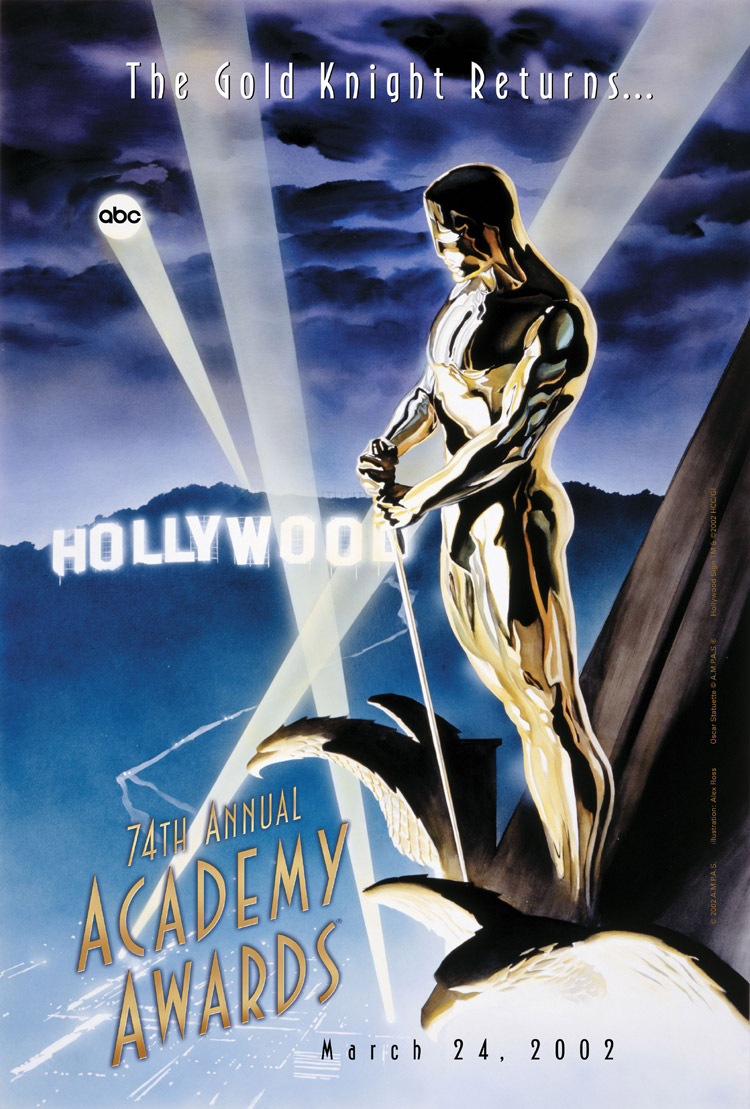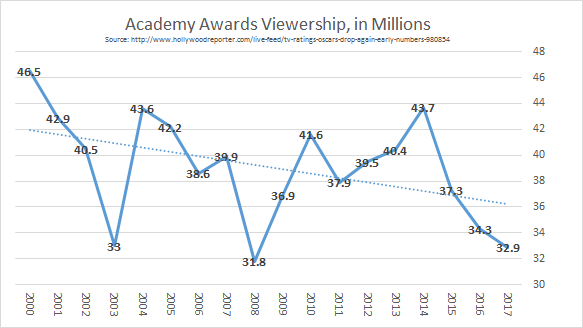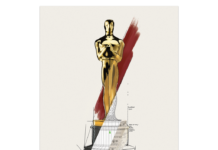[Note: Not comics news specifically, but we’re film geeks here at The Beat, and know some of our readers are as well.]
The Hollywood Reporter has the overnight television ratings for last night’s Oscar telecast, and they’re not good.
After initial indicators had the lengthy show off from 2106, time zone adjusted tallies give this year’s Oscars an average 32.9 million viewers. That marks a 4 percent drop in viewership from the prior. Early stats had the show averaging an overnight 22.4 rating among metered market households. (Last year’s, which saw its overnight score (a 23.4 rating), ultimately translate to 34.43 million viewers.) In the key demo of adults 18-49, the show averaged a 9.1 rating — off a more dramatic 14 percent from the 2016 telecast which averaged a 10.5 rating among the advertiser-favored viewers.
THR also supplies a list of the ratings since 2000, and me being a numbers wonk, I made a nice graph:
It should be noted that the Oscar telecast usually ranks in the Top Ten every year, but about a third of the number that watches the Super Bowl.
So, what’s wrong with the telecast?
Is it the host? Well, usually, that’s the reason for tuning in… either it’s a returning host who has a good reputation (Bob Hope, Johnny Carson, Billy Crystal), or it’s someone new with an interesting point of view, usually a talk show host (Ellen DeGeneres, Jimmy Kimmel, Jon Stewart, David Letterman) or a comedian (Chris Rock, Seth MacFarlane, Steve Martin).
You either watch because you know s/he will do a good job, or because you’re curious what might be said, what might go right or wrong.
Sometimes, the Academy gets crazy, and doesn’t have an emcee, just the presenters. Or sometimes, it’s a group effort, with two or three hosts. (The Academy hasn’t done the “none” or “three or more” thing since 1989, and the last duo was the disastrous “won’t dance, can’t make me” pairing of James Franco and Anne Hathaway of 2011.)
The presenters are even less of a consideration. The Academy usually teases the press releases the week before, but I think only hardcore fans will tune in just to watch their favorites.
Sometimes, the producers will juice a show with a particular theme (2002’s tribute to New York City, 2013’s tribute to James Bond), and while those segments are well done, it’s not something which drives viewership. I think it’s more “let’s keep the show entertaining”.
Is it the nominees? I don’t think so. Some might complain that the Academy Awards are too artsy-fartsy, but I think that’s because of two developments:
- The rise of independent cinemas and distribution has encouraged the major studios to fund smaller features. (The Miramax Effect.) The per-screen revenue for an indie movie can rival the box office of a first-week blockbuster.
- The compressed awards calendar, campaigning, and marketing allows Hollywood studios to release films late in December, and have nominees gain box office through the doldrums of January and February (and a possible DVD release in March, but this market is not as important as it once was).
There were lots of “good movies” back in the 70s and 80s that adults watched, which were “serious”. Now, I believe there are more studios producing movies, as there are more revenue streams. (Moonlight was distributed by A24, which has a deal with Amazon Prime and DirectTV.)
Furthermore, with the expansion of the Best Picture category to a maximum of ten films, plus Best Animated Feature, there are more “fan favorite” movies for the general public to celebrate. Of course, any genre or popular film has to be even better than a serious movie to garner nominations in the big categories.
Is it the length? Well, yes and no.
No: Four hours on a Sunday night isn’t that bad, generally. People regularly tune in for event television like the Super Bowl or the Grammys, or even series marathons, or even binge watching online.
The Oscars ARE event television, with even more hype than the Super Bowl. Instead of two favorites, you’ve got 62, from Rogue One to Hidden Figures to Captain Fantastic and Fantastic Beasts and Where to Find Them.
You’ve got jokes, you’ve got live performances (Sting! Justin Timberlake! John Legend! That guy who wrote Hamilton!), you got celebrities and fashion and glamour and unbridled emotion!
There’s stuff for the kids (animation, special effects, songs from Disney)! There’s stuff for the adults (the monologue, the Oscar pool, In Memorium). There should be stuff for teens and new adults (music, the host), but as seen in the THR article above, that’s a hard demographic to reach.
Yes: The way it’s scheduled now, ABC wastes too much time on the red carpet and backstage interviews, starting the actual show too late in the evening. This year, the first award, for Best Supporting Actor, wasn’t presented until 8:49 PM, Eastern Time, almost two hours into the time slot!
THR lists the running time as three hours and 49 minutes, and that would fit perfectly into the four-hour time slot on a Sunday evening.
ABC and the Academy should steal from the NFL’s playbook: Start the pre-game at 4 or 5 PM Eastern Time (1/2 PM in Los Angeles), with the red carpet, the analysis, the interviews and profiles filling up what is usually dead time on a Sunday afternoon (and earning twice the ad revenue). Then, at 7/4 PM sharp, you start the show. It runs, it’s done, and if it ends early, then ABC fills the time with interviews, analysis, or repeats of the best moments of the night. (Or the director lets the Big Five winners talk longer.) Or they flip it to the local news team, starting the 11 o’clock news early, beating the other local networks, and flip it back to ABC for the late night after-party at 11:20, keeping the hardcore viewers watching until 1 AM or whenever.
Ever since the 70s (if not before), the Oscar telecast has always run long. It’s a given, and I think it’s why many people don’t watch it anymore… who wants to hold an Oscar party when the show runs past Midnight on the East Coast, and you’ve got to drive home, and then get up the next day for work? (Yeah, some of us do that weekly…)
If ABC and AMPAS can guarantee that the show will end at a suitable hour, then friends and families can make it an event night. You can let the kids stay up late because it’s fun and safe television. (Seriously, I don’t think I ever got a single joke Johnny Carson told at the Oscars.) You can have friends over for an Oscar party, and know that you’ll be okay in the morning. It then becomes a tradition, and even if you’re not that interested in the actual show, it’s a reason to have fun with friends, just like the Super Bowl.
Standardize the time slot. Hire decent hosts. Keep it lively. Make it a tradition and a cherished memory.
That’s what will gain more viewers, better demographics, and higher ad revenue. (And fewer articles about how long the Oscars are every year!)









“Is it the nominees?”
In the ’70s, great and very good movies for adults were financed and/or released by major studios. That decade’s Oscar nominees and winners included MASH, Five Easy Pieces, The Last Picture Show, Clockwork Orange, The Godfather (parts I and II), American Graffiti, The Conversation, Chinatown, Cuckoo’s Nest, Taxi Driver, All the President’s Men, Network, Annie Hall, Coming Home, The Deer Hunter, and Apocalypse Now.
All of those movies came from major studios and played all over the country. Today they would be indie films and would have “limited” release, mainly in large cities. The big studios are now focused on franchise movies to the near-exclusion of anything else.
Oscar voters are still, for the most part, nominating the same sort of adult fare they nominated in the ’70s. But that sort of movie rarely comes from the major studios these days. Which limits people’s ability to see them in theaters, because the majors utterly dominate the multiplexes.
Yes, the timeslot and length is killer (it ended at midnight in CST for me and I was yawning) and people weren’t super excited this year, although that ending was a big surprise! They became more “diverse” this year, but lmao they still have a long way to go for representation. Plus, more people are binging TV shows (which makes the Golden Globes more attractive, plus their hosts are more entertaining) instead of watching those depressing Oscar-bait movies.
Also, it’s super depressing when you’re hoping that a non-Disney animated film might win, but you know it doesn’t have a chance against Disney films (aka the film that’s most likely to be watched by families).
You list the host, the nominees and the length as key factors in the drop-off, but I think you’re missing something entirely:
Is it the audience? Maybe – just maybe – the audience for self-congratulatory awards shows has diminished in this age of “I can always watch whatever I want whenever I want” entertainment. If anything notable happens in an acceptance speech or in the ceremony I can see it on YouTube the next day. Or not, because as I’ve stopped watching it I’ve realized I don’t even care anymore. Most of the movies up for awards I won’t even get to see until months after the ceremony because they dump so many movies onto audiences during “awards season” at the end of the year that there is no way that I can see them and form an opinion before the award ceremony anyway. Plus I don’t watch as many movies now as I did in my youth – the time that I used to spend watching movies has been absorbed by either work pushing into my personal life or serialized TV drama that I can watch “on demand” when I have the time.
I don’t know what they can do to make the Oscars something that I would watch again – even though I used to tune in every year. I’m no longer the audience for it, but I strongly suspect that the audience for it in this brave new world of digital entertainment is just a whole lot smaller than it used to be.
Torsten, you ignored the reason most given by Hollywood peeps: award show fatigue. It used to be there was just the Golden Globes (in December!) and then the OScars. Exposure was limited. NOt we have the GGS, the PGAs, the people’s choice, and gavel to gavel trade coverage of the DGA, WGA, PGA and all the other awards. Oh and the SPirit awards the day before. By the time the Oscars air we’ve already seen the same speech a half dozen times. I remember Jamie Foxx giving the same tearful speech about his grandma at every awards show when he won for Ray. To be fair, he IS an actor who knows how to remember his lines. What was he supposed to do?
The Golden Globes mostly telegraph the winners months in advance and they have the freshest takes. The Oscars are really old news by the time they happen.
I think you’re really downplaying the choice of movies nominated. If Americans don’t care about the movies nominated why the hell should they watch? With the exceptions of La La Land and Hidden Figures none of the nominees even played where I lived. Not only did I never even see Moonlight, I never even saw an ad for it. I had no idea what it was about and thus no skin in the game. And this has been pretty much the standard for the last decade or so. Not everyone lives in a big city or even a small city with an art theater. If the public doesn’t care about the nominated films, there’s simply no reason to spend the time watching, Especially in this day and age when there’s so many other options.
I think it’s the nominated movies. No one cares if the best picture catagory is full of movies they’ve never seen. How do you fix that? I dunno….
Also, the show is just boring. Other than the mistake at the end, nothing interesting happened. The comedy is bad, the speeches are boring…it needs some life.
I think a relevant comedian host would help. Where’s Amy Schumer or Eric Andre?
I’m pretty left-leaning, so it doesn’t matter to me, but I hear from some that they feel like they’re being “talked down to” by the “Hollywood elite”. Those aren’t scare quotes, btw, just separating their thoughts from mine and why some folks in the heartland might not be tuning in.
The same folks who think Oscar voters are “elites” also think Donald Trump and Steve Bannon are regular, down-to-earth guys. Sigh.
Awards show fatigue?
1) I don’t see much reportage on the guild awards in Google News. Maybe, for the diehard film buffs, there’s some fatigue.
2) So… is there playoff fatigue with the Super Bowl? How many people don’t watch the playoffs, but do watch the Super Bowl, because it is Events Television, a reason to have a party? How many people at a Super Bowl party are there just for the food, or the commercials, and don’t care about the game? That could be the same for the Oscars.
As for the Golden Globes being a predictor? Nope. It’s a country club picking winners. It’s not a predictor because of the small voting population (90 members). It’s not a predictor because they split drama and comedy.
Do the Tonys and the Grammys have the same problem? Why do they work, but the Oscars don’t? Do the Emmys have performances, or is it just awards? How do the ratings compare?
I think a sporting event with an unknown outcome and different players every time is totally not comparable to awards shows where the same movies are up against each other for months at a time, and the same winners make the same speeches.
Google News isn’t the marker here. Gossip websites and magazine have in depth coverage, who wore it best, quotes, photos, backstage stories…constantly. This is a pretty robust web category, so anyone who is interested in that kind of thing will be inundated with pictures of Emma Stone in designer dresses for weeks, instead of limited exposure beforehand.
It’s not that it’s a direct thing, just a drip drip drip.
A couple of links about awards show fatigue
http://www.tvinsider.com/74697/awards-show-fatigue/
http://www.usatoday.com/story/life/tv/2016/02/29/oscar-ratings-drop-8-amid-diversity-push-awards-declines/81108254/
Comments are closed.